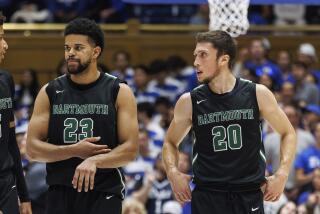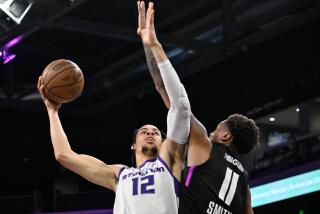Massachusetts Basketball Has Run Into Full-Court Press of Problems
- Share via
AMHERST, Mass. — In the predawn darkness, officer Jerry Millar trailed the suspicious car. Its headlights were off and it was going the wrong way on a one-way street, authorities say.
Then the report came in to the police station: burglary on Amity Street.
Millar caught his quarry on North Pleasant Street and got out of his cruiser. He found a portable stereo in the car, according to the police report. The three occupants were arrested. It seemed routine except for one thing.
The three occupants were basketball players.
David Brown and Duane Chase had left Baltimore for grassy western Massachusetts 3 1/2 years earlier. Full athletic scholarships were their tickets out of the busy city and into this small, more affluent college town.
They were starters on the University of Massachusetts basketball team for all four of their seasons. This season, Brown was the Minutemen’s captain and leading scorer. Chase was averaging 8.3 points and 7.3 rebounds per game.
Later on the day of their arrest, they were suspended from the team.
George Hardin barely knew them. He was transferring to the school and had been in Amherst only about 30 hours. He apparently thought he was accepting a ride home.
Soon after his arrest, questions arose about whether his admission to the university violated NCAA regulations.
John Calipari already had enough problems. An assistant at Pittsburgh, he became coach of the Minutemen last May. The university where Julius Erving played basketball hadn’t had a winning season since 1977-78.
That wasn’t all. Former Massachusetts players recruited under Ron Gerlufsen, Calipari’s predecessor, had been suspended for violating team rules. Three of Gerlufsen’s recruits had transferred to other schools.
“I was hired for a reason--to clean this place up, the academics and the kids’ personal lives,” Calipari said.
Now two of his top players, both recruited under Gerlufsen, and one recruit had been arrested. All three were charged with two counts of unarmed burglary, possession of burglary tools and using a motor vehicle in the commission of a felony.
The unarmed burglary charges were reduced to breaking and entering, which does not require presentation of the case to a grand jury, Meade Burrows, Chase’s attorney, said. He said the maximum sentence in District Court, where the case will be heard, is 2 1/2 years.
“It’s a relatively routine case but for . . . the identity of the defendants,” Burrows said.
The three defendants pleaded innocent and the case was continued until April 6. Richard Carey, who represents Brown, and Alan Rubin, Hardin’s attorney, declined to discuss specifics of the case.
The alleged incident happened about a mile from campus at about 2:50 a.m. on Jan. 3, 16 1/2 hours before the Minutemen were scheduled to play West Virginia. Calipari suspended Brown and Chase for violating a midnight curfew and said his team, 5-3 at the time, might not win another game all year.
“This year, it will hurt us immensely,” Calipari said. “But what about those two kids? Was it a glitch or are they bad apples?”
The basketball program hasn’t been hurt as much as he thought. The team is 3-3 since losing its first five games after the suspensions. And the NCAA apparently has no interest in looking into Hardin’s recruitment.
But Brown and Chase, both seniors, haven’t had it as easy. They have withdrawn from school.
“For many of us around here it was a shock” that Brown and Chase were linked to the incident, said M. Ricardo Townes, an associate dean of students at the university. “Both of them are pretty nice people who everybody respects a lot.”
“You take a lifetime to build up your reputation and you ruin it by making a bad decision in 20 seconds,” Calipari said. That decision was to break curfew, he added.
He was puzzled why two young men had made it nearly all the way through college only to jeopardize their futures.
“I don’t think anybody has the answer to that. Why? I ask my wife that. I ask everybody. Why would they do that?” Calipari said.
“Why would they go out after curfew when you know we have a big game?” he added. “You have a chance to maybe play overseas.”
Brown, who police said was driving when the car was stopped, was a team leader by example, had good manners and never swore--”a gem of a person”--Townes said. “He’s just the kind of guy who people gravitate to.”
Chase is more of a follower, Townes added, although “I don’t want to suggest he can’t think for himself.” Calipari said Chase had worked very hard academically, last fall was his best semester as a student and he had the discipline to lose 25 pounds for this season.
Hardin “obviously got taken along for the ride,” Townes said.
The night of the alleged incident, the three players reportedly attended a team meal at a local restaurant from about 9 p.m. to 10:45 p.m. Then, a school official said, they went to the home of a friend of one of the players to watch a football game on television.
Hardin apparently noticed the lateness of the hour and was concerned about missing curfew.
After Hardin was arrested, questions were raised about whether he had been formally admitted to the university before he practiced with the team, an apparent violation of NCAA regulations.
Calipari said he was told by the admissions office Dec. 27 that Hardin had been admitted and that a formal letter would be sent as soon as a transcript was received directly from Mount San Antonio College, a junior college in California. Calipari said the admissions office already had seen his own copy of the transcript.
Calipari was in Florida at the time for the Florida Today Classic and had Hardin fly there, at school expense, from Salt Lake City to practice.
The admissions office said that because paperwork hadn’t been completed, Hardin was not formally admitted at the time, university spokeswoman Jeanne Hopkins said, adding that his admission became official on Jan. 13.
“The athletic department acted in good faith,” James Langley, vice chancellor for university relations and development, said. “The question is whether they may have acted too quickly.”
More to Read
Go beyond the scoreboard
Get the latest on L.A.'s teams in the daily Sports Report newsletter.
You may occasionally receive promotional content from the Los Angeles Times.










